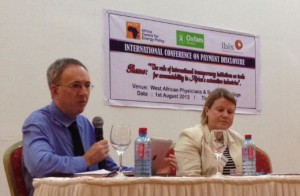In Ghana, government welcomes US, EU transparency laws
Tullow Oil wants to “get ahead of regulators.” US stands behind Dodd-Frank Act.
The African Centre for Energy Policy, IBIS Ghana, and Oxfam America co-sponsored the International Conference on Payment Disclosures in the Extractive Industries in Accra on August 1st, to discuss the role of international transparency initiatives as tools for accountability in Africa’s extractive industries. There I had the opportunity to share developments in the US, European Union, Canada, and elsewhere related to the global momentum for increased transparency in the extractive industries. Covered by major TV stations in Ghana and other news media across Africa, the conference in Accra had a number of highlights. Key quotes and links to presentations from the event include:
Hon. Alhaji Inusah Fuseini, Minister for Lands and Natural Resources
(Click here for Ghana Minister of Lands and Natural Resources Full Statement read on his behalf.)
On the usefulness of international transparency efforts: “International initiatives [that require clearer and more disaggregated reportage from firms listed in their countries] demonstrate the desire of the international community to hold their own companies accountable. However, they provide an important room for our citizens to also hold Government accountable in its relationship with the companies. There is no doubt that the initiatives complement our own policies and legal mechanisms.”

Wacam is an Oxfam partner that is helping the community of Tarkwa Banso to negotiate a compensation agreement with the Ghana Manganese Company (GHC), a mining company which wants to start mining for gold and expand its area of exploitation to include the agricultural fields of villagers. Photo: Jeff Deutsch / Oxfam America
On the plan to turn Ghana’s EITI practice into a legally binding requirement: “Ghana’s EITI Bill seeks to cover the entire natural resources sector (i.e., minerals, petroleum, forestry and fisheries) and the revenues that the state receives from the industries within the sector. The Bill is also intended to ensure increased transparency in the distribution of payments made to and received by local government units and traditional authorities, as well as transparency in the use to which these revenues are put.”
On the importance of transparency of contracts between the government and oil companies: “An important additional feature of this Bill is that it provides for contract transparency. [This] is essential not only for the purpose of tracking revenue streams, but also for ensuring the sustainable exploitation of natural resources by local communities and civil society organizations. Extractive industry contracts involve public resources and often act as instruments of public policy on fiscal, social, and environmental matters. On this premise, citizens are entitled to know the contents of these contracts.”
On better management of mining royalties to benefit communities: “Ghana has also decided to put in place a Mineral Development Fund Bill to provide transparency in the management of ceded royalties to mining communities. It is very important that enough capacity is built whilst financial management and tracking of revenue are becoming more and more sophisticated.”
Lesley Coldham, Group Public Affairs Manager, Tullow Oil
(Click here to view Tullow Oil Ghana Transparency Presentation.)

“We are taking the lead in our support for disclosure of payments to governments and we are acting ahead of regulatory changes…Payment disclosure helps in the management of local expectations.” (Coldham said that Tullow is considering disclosing payments next year on a project level in every country of operation – a year ahead of a legally binding requirement in the EU.)
“We’ve always said we are happy to put our contracts in the public domain. If you’ve got nothing to hide you should be happy to publish contracts.”
“It doesn’t benefit us if the government can’t negotiate with on the same terms as us. There is no advantage to taking advantage. We want to be in the country for the long term.”

Hon. James Avedzi, Member of the Ghanaian Parliament and Chairman of the Select Committee on Finance
On revising Ghana’s fiscal terms for oil:
“Now that we are 100 percent sure that Ghana has oil resources, I believe that the allocation of oil blocks from now on should be done in a manner that would make the country reap the highest returns.”
“The Petroleum Exploration and Production law being developed should include a distribution formula that would ensure that Ghana receives its fair share of the oil resources.”
“Parliament had to carry out over 300 amendments of the Petroleum Revenue Management Bill, which is now being praised as one of the best around the world, and if the need arises, we would subject the exploration and production bill to a similar process to make it even better.”
Hon. Emmanuel Armah Kofi Buah, Minister of Energy
(Statement read on his behalf.)
On oil company corporate social responsibility (CSR): “Some extractive industry companies provide CSR projects such as boreholes and schools without consulting local communities. Sometimes these fall outside of local development priorities of local communities, creating conflicts between companies and local authorities. CSR projects need to align with projects of local authorities.”
Mohammed Amin Adam, Executive Director, African Centre for Energy Policy
(Click here to read Africa Centre for Energy Policy Full Statement.)

Mr. Adam applauded the policy directives issued to the Ministries of Energy and Lands & Natural Resources in late July by President John Mahama to map out potential areas of resource accumulation and adopt a public auction process for licensing concessions.
Mr. Adam called on the government to include open and transparency bidding processes for licenses in the pending Petroleum (Exploration and Production) Bill to help implement President Mahama’s directives.
“While testifying before a US Congress sub-committee of the Foreign Affairs Committee two weeks ago, I mentioned that Ghana still faced serious risks with oil and mineral resource management due to the country’s inability to extend transparency to the whole extractive industries value chain. For instance, there is no open tendering or bidding process for acquiring prospecting or exploration rights in both the oil and mining industries. Companies and individuals are awarded licenses through an administrative process. There is also no mandatory contract disclosure and some petroleum contracts published recently were done at the discretion of the Minister of Energy. Beneficial owners are not disclosed, which promotes rent seeking behavior…”
“The issue of tax evasion has become alarming with Ghana reported by the Global Financial Integrity to have lost about US$4.9 billion through illicit financial flows including lost revenues from resource taxes between 1970 and 2008. The Government of Ghana also estimated in the 2012 Budget Statement that Ghana loses about US$36 million annually from the mining sector through abusive transfer pricing. This raises issues of corporate transparency and corporate tax responsibility, two important issues that have engaged global attention on the mechanisms to expose the enemies of resource rich countries including their collaborators in the host countries…”

Joel Wiegert, Economic Chief, US Embassy in Ghana
(Click here to read US Embassy Economic Chief Full Statement.)
“My government firmly believes that transparent reporting of payments made by companies to governments for the extraction of natural resources can help empower citizens and investors, and combat the corruption and mismanagement of resources that impedes economic growth, reduces opportunities for trade and investment, and can contribute to instability and conflict…”
“As you know, Section 1504 of the United States’ Dodd Frank Act sets a new, higher standard for transparency in the extractive industries by requiring certain companies that already file annual reports with the Securities and Exchange Commission (SEC) to disclose certain payments at the project-level. The US District Court decision on July 2 did not invalidate Dodd-Frank Section 1504. Section 1504 remains US law. Only the SEC’s rule implementing Section 1504 was vacated and it was sent back to the SEC for further rulemaking. As we await the outcome of the SEC’s determinations, we remain committed to using Dodd Frank as a valuable tool in promoting increased transparency around the world.”

Nadine Kone, Regional Extractive Industries Program Officer, Oxfam America
“For transnational transparency initiatives like Dodd Frank to be effective, they have to be supported by domestic mechanisms through which public accountability can be exercised, capable and efficient extractive regulatory institutions, well- informed citizenry, and vibrant civil society with strong knowledge and capacities to use the information provided.”
***
Support communities’ right to decide about oil, gas, and mining development, and right to know about its impacts, by following the Right to Know, Right to Decide page on Facebook.